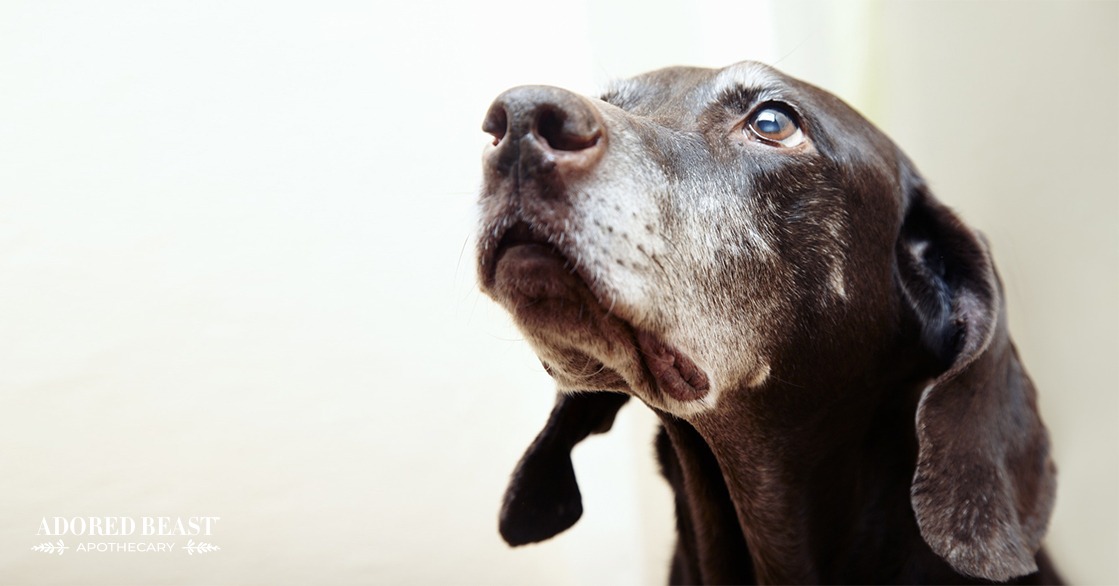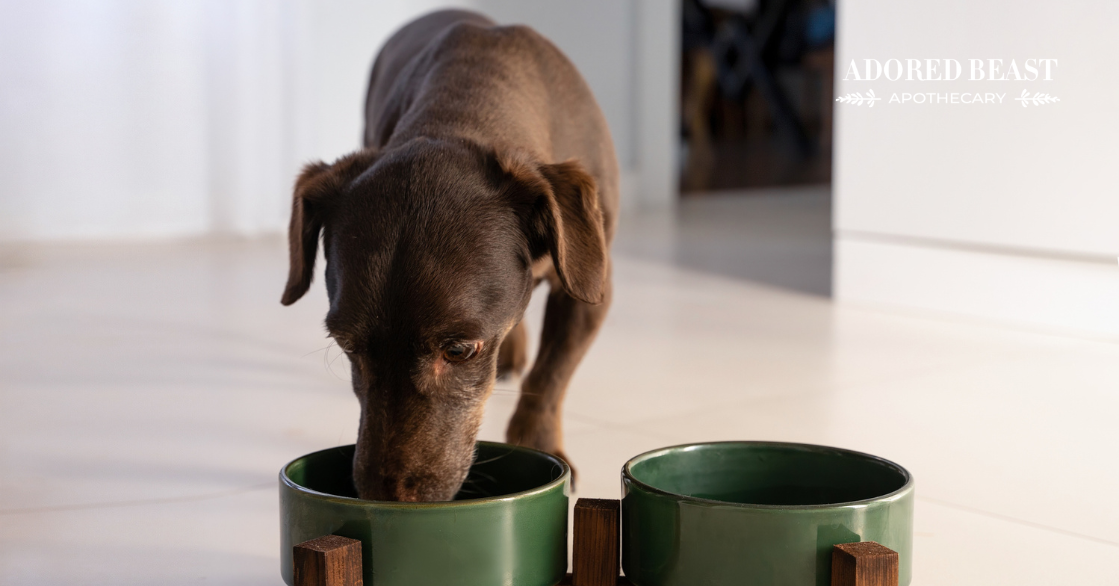A few years ago, as she was getting older, we noticed that our senior girl, Inuk, was wandering a lot at night. She’d become confused about things that hadn’t changed, and certain things seemed to spook her. (This was actually a very gradual progression, one that happened over months, not weeks.) We also noticed that the wandering was focused, not just a casual walk, but more a state she was in that she couldn’t seem to shake. Even trying to settle her didn’t work.
We had our suspicions, so off we went to the vet. The diagnosis? Canine cognitive dysfunction (CCD), AKA dog dementia.
This is actually a fairly common condition in older dogs. In fact, stats suggest that as many as 50% of dogs over 11 will display some signs. Inuk was not alone (and nor were we, as her parents).
So what is dog dementia? What causes it, what are signs to watch for, and how can you help protect your dog?
What is Dog Dementia?
Dog dementia is a cognitive disorder that looks very similar to Alzheimer’s in humans. It’s related to the aging of a dog’s brain, which leads to changes in behaviour. The exact cause is currently unknown. However, the disease is often linked to the physical and chemical changes that occur in the brain as part of the aging process. That said, genetic factors or other diseases may also predispose an animal to develop dementia.
The signs of dog dementia can range from mild to severe, and there are several. It usually develops very slowly. Because of this, it can sometimes be hard to spot – many people just assume the symptoms are a ‘normal’ part of the aging process.
For example, one of the first signs we noticed was anxiety. Inuk had never been an anxious dog. A few years before this, she lost her hearing, and the following summer we noticed fireworks started to really bother her (they never had before). We thought the hearing loss was the culprit, but we learned it was more likely a result of the CCD. This was right at the start of her symptoms developing.
[RELATED] There are many things you can do to support your dog as they age. Check this out.
Signs of Dog Dementia
These are the most common symptoms of dog dementia:
- Whining or more barking
- Becoming clingy, needing company more, especially close company, or even needing to be touching you
- The opposite – more reserved and wanting to be alone or away from their family or if company or groups of people are at your home
- Increase panting
- Drinking more water or more often (CCD can sometimes be mistaken for other diseases or pain and do often come together with the onset of arthritis)
- Needing fresh air or asking to go outside more but then not urinating or defecating – just standing and staring
- Easily startled
- Disorientation and confusion, especially in familiar surroundings
- Anxiety or nervousness, either increased or new
- Failing to remember routines and previously learned training
- No longer responding to their name or familiar commands
- Extreme irritability
- A decreased desire to play
- Aimless wandering, particularly at night
- Staring blankly at walls or at nothing
- Slow to learn new tasks
- Lack of self-grooming
- Loss of appetite
- Changes in sleep cycle like night waking and/or sleeping during the day
NOTE: Your dog may display one of these signs, or several. And it may not be dementia specifically that causes the behaviour. Diagnosis needs to be done by your veterinarian so that they can rule out other conditions.
Protecting the Brain
Once we had our diagnosis, we knew there were things we could do to support Inuk – some were things we were already doing, and others were changes we made to help keep her calm and content.
Supplements
- Pre and probiotics – The Gut-Brain Access is well understood, and we know that without gut health, brain function is incredibly impaired. Research shows probiotics can help to slow down cognitive decline. In fact, studies suggest probiotics for both prevention and to help slow the progression of Alzheimer’s.
- Omega 3s – While important for overall health, omega 3s play an important role in brain health.Try algae oil for a pet- and environmentally-safe alternative to safe oil.
- Lion’s Mane Mushroom – Studies show that this medicinal mushroom can help protect against dementia and even alleviate symptoms.
- Medium-chain triglycerides (MCT oil) – This helps to increase blood ketone levels and improve age-related decline in cognitive function.
- Antioxidants – These are important at any age but are especially important when dementia is at play. High levels of free radicals lead to a decline in cognitive function, so antioxidants can help balance those levels out. Antioxidant-rich foods are good, but supplements typically provide more. We use phytoplankton because of the superoxide dismutase (SOD). SOD is an enzymatic antioxidant that plays an important role in protecting cells.
- CBD oil – When Inuk was in a wandering spell, we gave her CBD oil to help calm her naturally.
- Homeopathy – Your Go 2 (aconite and arnica) can help to calm the nervous system, or work with a qualified animal homeopath as there are many remedies that can work wonders.
Other Tips
- We didn’t leave Inuk alone for extended periods of time. If we were going to be gone for several hours, we made sure someone could come check in on her, and even just sit with her for a while.
- We avoided making big changes at home. For example, her bed stayed in the same spot, and was moved only when it was being washed. Keep furniture where it is, and avoid any big moves if at all possible.
- Stick to a routine as much as you can. Having consistent times for bed, bathroom/outside time, food, and exercise can relieve some of this confusion and stress. Some deviations are okay, and sometimes unavoidable, but if you can establish some sort of routine that can help.
- When we went somewhere and would be gone for a longer period, we would bring the sheets from our bed down and put them on her bed. We found the familiar smell helped keep her calm and reduced her anxiety. Try used towels or your worn clothes as well.
- Feed raw bones. Bone chewing is good because it keeps your dog focused. It also exercises the mandibular joint, which helps for lymphatic drainage at the base of the brain.
Can You Prevent it?
Since the exact cause is unknown, it’s hard to prevent dog dementia. Thankfully, there are things we can do to specifically protect the health of our dogs’ brains in the hopes of preventing it, or holding it off for as long as possible. That includes adding those supplements to the diet now!
Keeping your dog healthy and physically and mentally active may be the best thing you can do to help prevent dementia. (Also, keep these things up after a diagnosis!) You can do this in a variety of ways:
- Try not to over-medicate or over-vaccinate.
- Feed a fresh food diet as much possible. What is good for us is good for our dogs, and feeding processed, high carb, sugary diets are one of the worst things we can do to ourselves and our furry companions.
- Regular exercise is crucial – daily walks, hikes, or physical activity keeps both the body and mind sharp.
- Avoid the use of choke chain leads/collars. These can injure the pituitary stem which can lead to cognitive failure.
- Play brain games and teach new tricks often – this helps to exercise brain muscles, improving cognition and memory.
- Take them to new areas and let them experience new things (sights, smells, sounds).
- Keep them socialized (if this is ok with them – don’t force a dog to interact if they’re not comfortable).
- Avoid overly stressful situations and environments.
The Most Important Thing You Can Do
What’s the most important thing you can do for your beloved canine companion after a diagnosis of dog dementia? Be patient.
Hands down, that’s the best advice I can give. There were nights when Inuk required the same attention as a puppy. Some days you’d never know anything was wrong in that brain of hers. But on her off days, we were very patient with her. And you need to be as well. Don’t get upset or frustrated, and remember that your dog isn’t acting this way on purpose. It isn’t some bid for attention or a senior “terrible twos” phase. Inuk still acted like a puppy some days, and other days her age peeked through. Inuk has crossed the rainbow bridge, but every day, no matter what, she knew she was very much loved.












